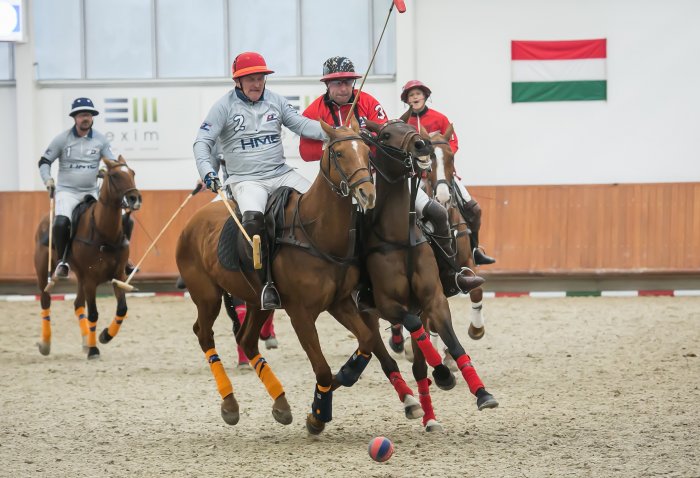Looking to Make Polo More Popular

Polo (and for the avoidance of doubt, I mean the equine-based version, not that played in a swimming pool) is definitely not a sport of the masses, but that hasn’t stopped a dedicated few from trying to reintroduce it to Hungary.
Polo is not cheap, but then neither are sailing, golf or show jumping. An hour of training costs as much as a tennis lesson or a one-on-one session with a coach in a gym, according to experts. But most seem to view it as the preserve of a privileged few.
For centuries, polo was linked to royalty, and several members of the British royal family, including Prince Charles and both his sons, William and Harry, have been keen players in their time. Indeed, it is sometimes called the sport of kings, although that tag is more generally attached to horse racing. What tends to be less well known is that it was also played by soldiers and probably originally served as a preparation for battle.
“Every cavalry regiment had a polo division and they practiced on Margaret Island before World War I,” Zoltán Németh, polo player and founder of the Hucul polo club tells the Budapest Business Journal. During communism, the sport was regarded a noble, elitist pastime and condemned, and it has never really revived since, he adds.
Yet a handful of committed people have been trying to reintroduce it to a wider circle. One such is Gábor Szegedi, founder and owner of La Ballena Horse Polo club at Budakeszi, on the western outskirts of Budapest.
Szegedi stumbled upon polo 15 years ago. A year later he went to Argentina to master its skills and launched the club, which is based at the Lóháton Budakeszin horse school, which he also owns, in 2012.
Market Opportunity
He started to engage in the training of polo ponies, and also takes horses in livery (boarding), mostly out of passion, but also because he saw a market niche.
“In the past four-five years, the number of show games, beach polo, snow polo, etc. has increased in Europe,” he says.
“Many patrons (amateur players who ‘do’ polo out of passion and finance a professional player or even a team) would stop riding in October and wouldn’t start until March. This is where the market opportunity was: I started to prepare these horses in December and they were ready for events like the snow polo game in Kitzbühel by late January.”
Gradually, Szegedi established a reputation; in 2015, he was hiring out horses in St. Moritz, at one of the most prestigious horse polo events in the world, to Argentine players. Fast forward a few years and, together with Gergő Szabó, owner/CEO of Ganz Kapcsoló- és Készülékgyártó Kft., he organized the Budapest Arena Polo Masters, a major polo show which took place this April, partly with the aim of reaching more people.
Among the players at the Budapest Arena was Uwe Zimmermann, a businessman in private banking, who has been playing polo for 25 years. Zimmermann is also the founder/owner of La Estancia Polo Club at Etyek (30 km west of Budapest), a private organization mostly for family and friends.
Though he says he plays the sport out of passion, Zimmermann agrees that polo helps build ties in business. It is one of the few sports that has kept its uniqueness, and as such, it serves business purposes very well, he says.
“It will never be a public sport because it is very elite, very difficult to play, very intense and expensive and it requires a lot of commitment from people playing it, not only financially but timewise.”
It also needs a lot organizing and structure – polo fields out of necessity are large, to give the horses turning space, although arena polo is played on a smaller area with one fewer rider and horse per team – and people to help with the horses.
Shared Passion
“After playing so many years, you get to know a lot of people – polo is played by 12,000 people in the world – and you meet people you would never meet in normal life, from the Maharaja of Jaipur to Hollywood actor Tommy Lee Jones,” Zimmermann says. Having the same passion for the sport, they are more likely to open up and talk than in other circumstances.
Wealth is an inevitable part of this sport, and it is played at a different scale in the more well-off countries. It is, perhaps, not a great surprise that Switzerland has the highest number of polo players in Europe.
From a population of seven million people, around 200 play, the same number as in Germany, which has more than times more population. In Hungary, the number of active players is 20 at best, with just ten playing it seriously, Zimmermann notes.
Yet that is only part of the reason why polo has not developed very fast in Hungary, a country with strong equine traditions, after all.
“I have not been able to find the reason why. It does require solid riding skills, for sure. But it is not more expensive than sailing or showjumping,” Szegedi insists. And he does not believe it is particularly elite, saying it is commonly played in the countryside by Argentinian children.
“A solution could be to support the young; there are some very talented young players around,” he adds. Dissension between the very few Hungarian clubs, typical in many sports associations, does not help either. Stronger cooperation among clubs and a commonly created vision for the future are needed to help advance the sport in Hungary, Szegedi believes.
The Groom’s Story
Polo horses are quite different from riding school horse; how they are trained and maintained are key to a successful match. They also tend to be more focused and more co-operative and have an air of peacefulness around them that makes working with them interesting, says Zsófia Somkuti, who works for La Ballena Polo club. Somkuti started riding at a very early age. After an accident and a few years break, she returned to riding and started polo grooming.
“I am not primarily a polo player because it is not the game I am focused on but the horses,” she says.
Polo is such a complex experience; in order for one to be a really good player you need to trust your horse and be in excellent tune with them, she explains. Somkuti spent years in Australia and recently returned from Argentina, where she worked for professional polo players. “There is a hierarchy among professional players, patrons and grooms but by no means is this sport exclusive,” she insists.
“What we are trying to achieve here at Budakeszi is to debunk this myth of having to have a lot money and wearing expensive clothes to join. Instead, we are looking forward to involve people interested in riding, in a competitive sport, wanting to spend some fun time outdoors.”
SUPPORT THE BUDAPEST BUSINESS JOURNAL
Producing journalism that is worthy of the name is a costly business. For 27 years, the publishers, editors and reporters of the Budapest Business Journal have striven to bring you business news that works, information that you can trust, that is factual, accurate and presented without fear or favor.
Newspaper organizations across the globe have struggled to find a business model that allows them to continue to excel, without compromising their ability to perform. Most recently, some have experimented with the idea of involving their most important stakeholders, their readers.
We would like to offer that same opportunity to our readers. We would like to invite you to help us deliver the quality business journalism you require. Hit our Support the BBJ button and you can choose the how much and how often you send us your contributions.






